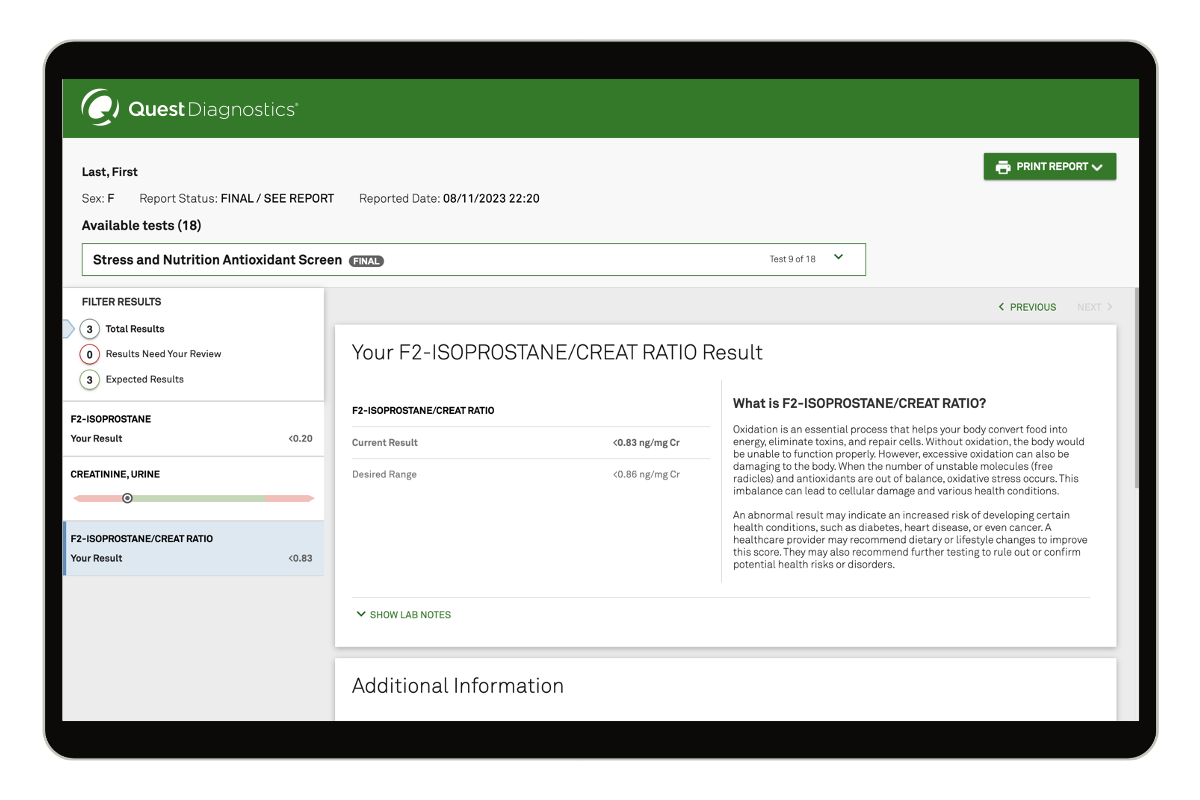Stress and Nutrition Antioxidant Screen
Measure your oxidative stress levels to help you understand how an imbalance in certain antioxidants can put you at risk for developing chronic health conditions such as cancer, heart disease, or other chronic conditions. Read moreOxidation is an essential process that helps your body convert food into energy, eliminate toxins, and repair cells. Without oxidation, the body would be unable to function properly. However, excessive oxidation can also be damaging to the body. This is called oxidative stress. This imbalance can lead to cellular damage and various health conditions.
This test is useful for anyone who wants to evaluate their oxidative stress levels, including those with risk factors such as smoking, unbalanced diet, high cholesterol (hyperlipidemia), or a family history of cardiovascular disease.
An abnormal result may indicate an increased risk of developing certain health conditions such as cancer, heart disease, or diabetes. A healthcare provider may recommend dietary or lifestyle changes or further testing to rule out or confirm potential health risks or disorders
How it works
questhealth.com offers 100+ consumer-initiated Quest Diagnostics lab tests to empower you to have more control over your health journey. Choose from a variety of test types that best suit your needs.
Your body experiences oxidative stress when your antioxidant levels are low. Antioxidants are molecules that fight free radicals in your body.
When reactive oxygen species (ROS), commonly known as free radicals, and antioxidant defenses are out of balance, your body experiences oxidative stress. This imbalance can contribute to developing certain health conditions. However, there may be some benefits from this imbalance. Although oxidative stress has more harmful than beneficial properties, some studies have shown that oxidative stress can help fight diseases like cancer.
Overproduction of free radicals can lead to oxidative damage to lipids, proteins, DNA, and RNA and may ultimately result in chronic health conditions, including hardening of the blood vessels (atherosclerosis), cancer, diabetes, rheumatoid arthritis, hypertension, cardiovascular disease, chronic inflammation, and neurodegenerative diseases such Parkinson disease and as Alzheimer’s.
Diet and lifestyle play a role in the development and management of chronic conditions. Prior to the onset of chronic diseases, it is advisable to determine whether lifestyle and nutritional changes are necessary and consult a medical professional for next steps.
Although it is difficult to eliminate free radicals and oxidative stress entirely, you can reduce the impact of oxidative stress on your body by:
- Eating more fruits and vegetables
- Reducing red meat consumption
- Exercising regularly
- Losing excess weight, weight management
- Quitting smoking
- Limiting alcohol intake
- Avoiding overeating
- Being aware of pesticides and other pollutants
- Wearing sunscreen
- Getting adequate sleep
Yes, psychological stress is associated with increased oxidant production and oxidative damage. Long-term exposure to psychological stressors may raise the likelihood of developing a variety of diseases.
Intense stress overstimulates the immune system, which disrupts the balance between inflammatory and anti-inflammatory responses. Chronic inflammation can harm cells and lead to the formation of free radicals. This can cause further damage to cells, resulting in a destructive cycle of cell death. While our bodies have mechanisms in place to repair this damage, if we are consistently stressed, these processes may become overburdened and unable to keep up. This can lead to an increase in oxidative stress and an increased risk of disease.


